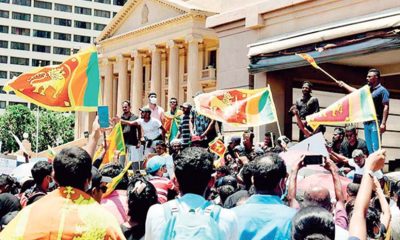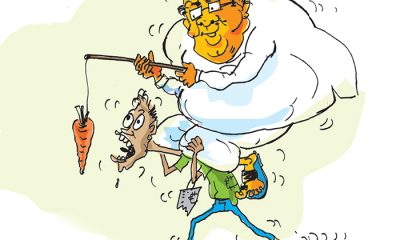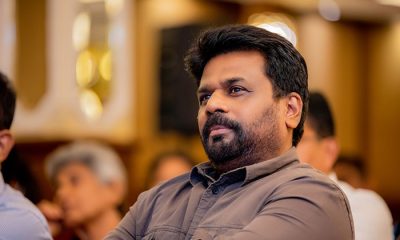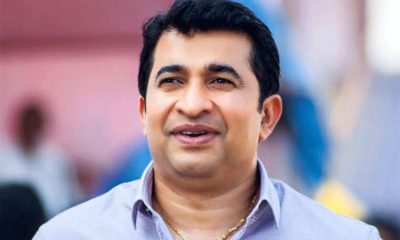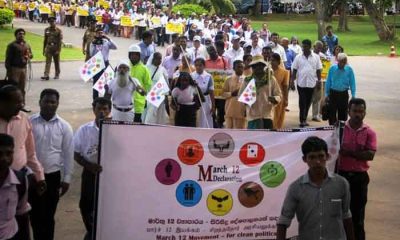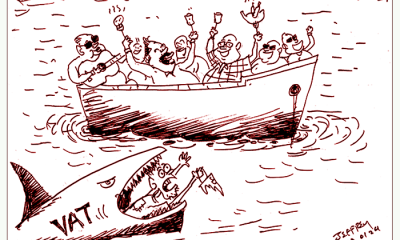Features
IGP stakes: why’s and wherefores of old values of succession being scuttled
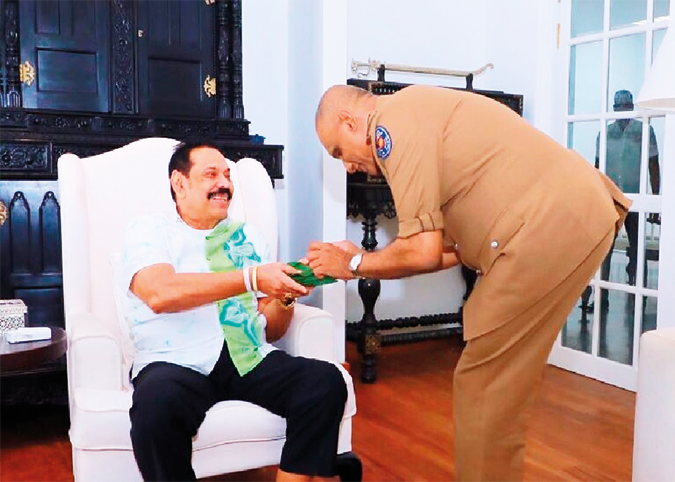
BY Kingsley Wickremasuriya, Senior DIG (Retd.)
The post of Inspector-General of Police is ‘vacant’ and the government is dilly-dallying with the appointment of a successor to take over, apparently for reasons of political expediency. This is the first time in the known history of the Department that the Police had to face such a situation.
In all these years the succession to the post of the Inspector-General of Police was almost automatic being based, by and large, on the line of Seniority and Merit. The post usually went to the Senior-most Deputy Inspector-General of Police, the most experienced and respected leader in the department. To name a few, Inspectors-General of Police Aleric Abeygunawardena, John Attygalle, and Cyril Herath were officers par excellence known for their integrity and impartiality and for doing their duty according to the Rule of Law.
The road to succession was known to be either through the post of Director of Headquarters Administration (DHA) or Director of Criminal Investigation (D/CID). This was the norm accepted by the rank and file. The succession was, therefore, smooth and easy and widely accepted by the rank and file and the country at large. This time-tested process gave legitimacy to the post of Inspector-General of Police in the eyes of all the stakeholders including the Police themselves.
In a disciplined service, rank is sacrosanct. An officer has necessarily to aspire to a higher rank through performance. If his work had been of exceptional merit and distinction, he may even be considered for a special promotion. A promotion can also be posthumous where the deceased officer had been exemplary in performance and achievement. An officer will therefore naturally like to safeguard his position in the line of seniority. He will be unhappy if a junior officer is placed over him merely because the latter wields influence. It is natural for an officer in a disciplined service to jealously protect his place in the line of seniority against encroachment (Merril Gunaratna, ‘Perils of a Profession).
This paper will try to find an explanation as to why the police have failed to ‘Serve and Protect’ the citizen, which is the main purpose of a Democracy.
Police & Politics
Police have in recent times come in for sharp criticism from various quarters ostensibly for their failure to contain the lawlessness prevailing in the country and to maintain the Rule of Law, particularly in the face of mass protests that took the country by storm. Critics allege the partiality of the police as the reason for their inability to enforce the Rule of Law. It has led to a near riotous situation being created in many parts of the country by police inaction against lawbreakers.
It is commonly known that this situation has been brought about by the politicization of the Police. A review of the constitutional history will show how undue political interference in police affairs has affected the legitimacy of the Police (and the legitimacy of the government itself, whose agents the police are) contributing to the current lawlessness in the country and the resulting failure of the police to enforce the Rule of Law.
Looking at the root cause, it has been found that the beginnings of political interference in the affairs of the Public Service were a problem even before the country gained Independence from the British. It had its origins in the early 1920s. The reports on the Colebrook – Cameron Reforms, the Donoughmore and Soulbury Reforms are a testimony to the measures they proposed to protect the Public Service from the undue interference of unscrupulous politicians.
Whilst these Commissioners made continuous efforts to ensure an efficient and effective Public Service by protecting it from undue political interference, the working of the Constitution in the aftermath of the Soulbury Commission showed how the highest in the political hierarchy of the country, no less a person than the Prime Minster himself (of the time) attempted to scuttle the legally adopted constitutional provisions by his attempts to circumvent the Constitution.
The legend has it that a Prime Minster (at the time) is alleged to have said once, ‘Public Service Commission or no Commission, I get whom I want’. We also have the story going around in police circles about how the same Prime Minster exhorted the then Inspector-General of Police, Osmund de Silva that the Police should have that ’extra bit of loyalty to the Government’, and how the Inspector-General responded in return by exhorting his officers that what they should uphold is the Rule of Law although he knew that he would be falling out of favour with the premier and that it would affect his tenure.
With all these attempts behind the scenes the Public Service Commission at that time worked reasonably well without a major hiccup until the introduction of the first Republican Constitution in 1972 that vested the responsibility of appointments, transfer, dismissal, and disciplinary control of all State Officers with the Cabinet of Ministers by Article 106 and other provisions in Chapter XII of that Constitution giving a blank cheque for political interference. The best illustrations of these efforts are the Chapter XII of the Republican Constitution of 1972 and Chapter IX of the Republican Constitution of 1978. This was the start of the process of politicization of the public service in general and the Police in particular.
In the meanwhile, the effects of these constitutional provisions brought about by Article 106 and the other provisions in Chapter XII of the first Republican Constitution (1972) on the Police have had far-reaching effects on its morale, and discipline. Consequently, delivery of services to the people has suffered severely resulting in the lowering of quality and professional standards that used to be maintained in the Police previously. With the proclamation of the Second Republican Constitution, the provisions of Chapter XII were given effect to more or less completely concerning the control of the Public Service in Chapter IX (The Executive) of the 1978 Republican Constitution. The effects of that on the Police have far exceeded those referred to by the Basnayake Police Commission (1970) or the Subasinghe Committee (1979) in their reports. This is confirmed by the report produced by the Jayasinghe Committee in 1995.
Police Reforms
As far as the Police are concerned several Police Commissions/Committees were appointed by successive governments to go into Police matters and report on reforms. The Soertz Commission Report (1946), the Basnayake Police Commission Report (1970), The Subasinghe Committee Report (1979), and Jayasinghe Committee Report (1995) on Police Reforms spoke eloquently of the impact these constitutional provisions had on the Police. They all spoke of how undue political interference undermined the moral of the Service, led to a poor public image, and loss of public respect or cooperation.
Jayasinghe Committee
In 1995 once again a three-man Committee was appointed by the President headed by Mr. W. T. Jayasinghe, a former Secretary to the Ministry of Defence ‘to inquire into and report on the reorganization of the Police Service’. The Jayasinghe Committee in particular in their report said that all the officers who appeared before them agreed that undue pressure was brought to bear in the matter of appointments, promotions, postings, and even transfers. These undue pressures were mostly from politicians and those close to politicians. They also agreed that this was one of the main reasons for the breakdown of discipline, loss of morale, and high incidence of corruption in the police. The interference did not stop with personnel matters like transfers, promotions, etc. It extended even to operational matters like criminal investigations.
As a result of the increasing incidence of interference by MPs in investigations, the Committee said that some of the officers who were fair and acted impartially were removed and transferred from their stations overnight at the instance of an MP because the offender happened to be a supporter of the MP, and yet others who had a well-known track record of corruption or inefficiency were promoted over the heads of those conscientious and dedicated officers. They also pointed out how in recent years junior officers have been promoted over their seniors, ostensibly on the ground of outstanding merit. This affected the morale of the entire Service.
While tracing back the history of the police to British times in an attempt to explain this phenomenon, the Committee said that the sole function of the police during that time was to safeguard the interests of the rulers. Even after Independence, the stance of the police did not change. The prime duty of the police now became the safety of the State instead. In the process, the police saw their immediate role to be safeguarding the interests of the government in power which eventually took the form of safeguarding the interests of the Members of Parliament (MP) of the ruling party.
They then went on to show how this relationship between the Police Officer and the MP became a particularly sensitive one, much more than that with other Government Officials because of the special demands of those constituents close to him to help them escape the rigorous application of the law by the police. Since every Government is faced with this dilemma resulting from this sensitive relationship between the MP and his constituents and consequently the MP and the police, the Committee thought that in the circumstance it would help the Government and the MPs themselves if a Police Service Commission is established as recommended by the Basnayake Police Commission in 1970 by easing the constituents’ pressure on MPs on police matters on the one hand, and that it will also go a long way to restore the morale and confidence in the police themselves on the other.
Almost all the officers who appeared before the Commission were “vehemently in support of the establishing of such a Commission.” They were further of the view that the Commission should play an active role, unlike the previous PSC in laying down policies and ensuring that they are scrupulously followed. Therefore, while recommending the establishment of a Police Service Commission they were of the view that the Commission should be appointed by the Constitutional Council of the Parliament and the members of that Commission should consist of senior serving or retired administrators, judicial officers, police administrators, and academics in sociology. They also suggested that the Constitution should be suitably amended to give effect to the establishment of a Police Service Commission. The recommendations were of no avail. Once again, the government did nothing to implement these recommendations.
17th Amendment
These recommendations however lay ignored for more than three decades when suddenly came the 17th Amendment, after a long period of inaction. The 17th Amendment was not the result of any of these recommendations. It was the result of some politicians in the opposition waking up from their slumber about police reforms and thinking of acting only after they had been themselves victims of delayed reforms and at the receiving end of a series of events affecting their political interests.
The 17th Amendment was the result of a political initiative launched by Members of Parliament in the Opposition led by the United National Party in 2001. The move was prompted by the violence and alleged election malpractices that was present during the Waymaba Provincial Council Elections in 1998, where it was alleged that “massive thuggery and vote rigging took place on an unprecedented scale”. It was not surprising that the UNP should take the lead because it was, they who suffered most during the election campaign being the victims of their constitutional device introduced during the UNP regime in 1978 placing unlimited power in the hands of the President. The Amendment naturally sought to neutralize or curb those powers vested in the President by Chapter IX of the Constitution of 1978.
The Amendment had its origins in the Report of the Citizens’ Consultation on Free and Fair Elections and De-politicisation of Key Institutions, which was set up by the Leader of the Opposition. That year a Drafting Committee was set up under the chairmanship of Mr. Karu Jayasuriya, MP where the OPA was represented by its General Secretary. A report was drawn up by the Citizens’ Consultation but it lay dormant till 2000 when a first draft of the 17th amendment was made.
After further consultation with an Expert Committee where three Senior Deputy Inspectors-General assisted in Police matters, a preliminary draft was presented by the OPA to the political parties. But what ultimately came out in Parliament on October 3, 2001 was something entirely different from the OPA draft. Even then, out of all the Institutions set up under the 17th Amendment, the National Police Commission was the most criticized by the politicians in the ruling party. If not for the JVP who put pressure on the PA Government, the 17th Amendment would not have seen the light of day even in this form.
Nevertheless, the Amendment wittingly or unwittingly introduced some of the measures contained in the recommendations made by the Basnayake Police Commission and the Jayasighe Committee. One of the major recommendations of the Basnayake Commission was the establishment of a separate Police Service Commission outside the jurisdiction of the PSC with an amendment to the Constitution. The 17th Amendment has already taken this step. It has also met the condition set by Jayasinghe Committee that the Police Service Commission be appointed by a Constitutional Council.
One of the other major conditions set by the Basnayake Police Commission was the Security of Tenure of the Inspector-General. It said that “An Inspector-General who has reached the age of optional retirement or has only a few years to reach that age is haunted by the fear that if he does not please those in power he may be retired either at once or the moment he reaches the age of optional retirement.” They pointed out that the head of so important a department being haunted by such fear in the performance of his very responsible duties is not in the public interest. The Basnayake Commission, therefore, recommended that the Inspector-General should be protected against the irresponsible exercise of the power of removal.
This safeguard is now provided by the Amendment under Article 41C by way of subsequent legislation in the form of Act No. 5 of 2002 which stipulates that the Inspector-General (amongst others) shall not be removed from office except following the procedure laid down in the Act. But, the power of grating extension of service is still in the hands of the President. That has not changed and the Amendment is silent on the matter. So, he will continue to be haunted by the fear of the threat of retirement and that fear will continue to hang over the incumbent like the ‘Sword of Damocles’ in the future as well if steps are not taken to rectify this situation sooner than later.
Therefore, it will not be a matter of surprise if he continues to secure his position by pleasing those in power to stay in office despite the many safeguards provided to bring the status quo back to square one. The amendment had several other deficiencies as well (for a detailed discussion on the subject, refer to the original article written by the same author, titled ‘Police. Politics and the 17th Amendment’ published in OPA Journal Vol.22 – May 2007).
Even if this fear is effectively removed through Constitutional Amendment, recent experience has shown that this argument is somewhat flawed in the present context of things considering the tendency some incumbents have shown to overreach their term to secure their position so that they could continue to remain in office even after reaching the age of retirement. The temptation not only to prolong his stay in office as long as possible but also to try and secure high office even thereafter has been reinforced by the recent practice of the governments offering prestigious postings abroad to the retiring Inspectors- General.
This encourages a ‘you scratch my back and I scratch yours’ kind of attitude. It also vitiates all the good intentions contained in the legislation designed to ensure the impartiality of the police by securing the tenure of the Head of the Department. The remedy may, therefore, lie in the appointment of the IGP for a fixed period of the contract, say for 3-4 years (as was the practice previously but discontinued later) with a ‘Retirement Package’ that will enable him to live comfortably without the lure of extensions beyond retirement age, ambassadorial postings or another high office so that he could do his duty by the people.
These, however, are safeguards against an IGP in office. What are the safeguards against the chances of an unscrupulous aspirant getting into office through political lobbying? This has often remained an open question probably until the next IGP stakes. So, safeguards have to be built not only against undue political pressure on the incumbent IGP but also against aspirants from getting to the top post through political lobbying. All other safeguards that have been proposed would be set at naught for having secured the post through lobbying it will be natural for the incumbent to feel obliged to his political Godfathers to ensure he continues in office.
So, when we are discussing ways and means of building public confidence in the police, what should be uppermost in our minds is not only an ‘Independent Police Commission’, but also an independent Head of the Police who by the circumstances of his appointment alone can infuse confidence in the public. Selection procedures (similar to the appointment to the post of Vice Chancellor) that are transparent enough to infuse public confidence in the appointment of the Inspector General have to be put in place in the future towards this end, without delay. Therefore, the need of the hour is not to rush with deadlines for reasons of expediency but to study the problem in-depth and bring meaningful reforms that will restore public confidence in the police, in due process, and in democracy.
Conclusions
The various Commissions on Constitutional Reforms from Colebrook-Cameron to Soulbury and several Police Commissions/Committees on Police Reforms such as Basnayake Police Commission, Subasinghe Committee, and Jayasinghe Committee on Police Reforms have all repeated the ill effects of political interference in the functioning of Police (one of the watchdogs of Democracy) ad nauseam and at great length.
But the provisions in the 1972 Republican Constitution concerning transfers, promotions, etc. of the public officers and its repetition in the next constitution in 1978 demonstrated the determination that has taken the better of politicians of all hues in this country against saner counsel opposing undue political interference in government affairs. Then came the 18th Amendment putting the clock back on all that has been achieved by the 17th Amendment. It simply demonstrated the obstinacy of those in power wanting to politicize everything under the sun.
The outcome of this undue political interference is a Police that is servile, inefficient, corrupt, and pliable that has lost Public Respect. Having lost their Legitimacy in the eyes of the Public they have forfeited their right to Public Support and their Respect for the Law (and the Police themselves). What is therefore at stake is not only the legitimacy of the Police but the very legitimacy of the government itself putting Public Security in jeopardy. That is why people have taken the Law into their own hands and resorted to mass action.
This is an ominous trend that needs to be remedied without delay. What is at stake is the legitimacy of all governments as could be seen from the peoples’ ‘uprisings’ in the form of protests, demonstrations, violence, etc. which are only symptoms of the deep malaise. Police are the bulwark of a democracy. If the Police fail all else will fail in a democracy. Playing with police is playing with fire. Therefore, it is time that civil society woke up from its slumber and take timely steps without waiting to shut the stables after the horses have bolted
Features
The US-China rivalry and challenges facing the South
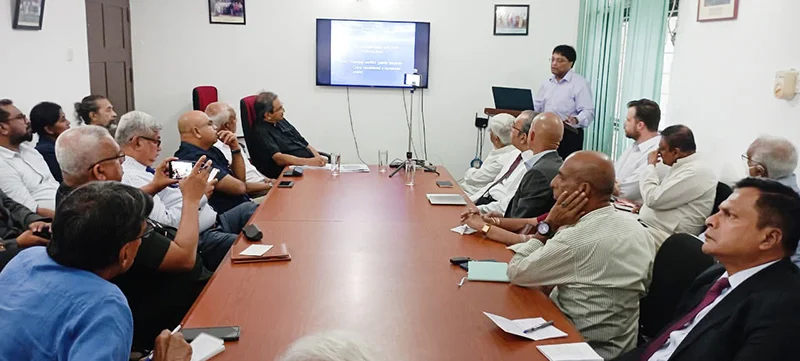
 The US-China rivalry could be said to make-up the ‘stuff and substance’ of world politics today but rarely does the international politics watcher and student of the global South in particular get the opportunity of having a balanced and comprehensive evaluation of this crucial relationship. But such a balanced assessment is vitally instrumental in making sense of current world power relations.
The US-China rivalry could be said to make-up the ‘stuff and substance’ of world politics today but rarely does the international politics watcher and student of the global South in particular get the opportunity of having a balanced and comprehensive evaluation of this crucial relationship. But such a balanced assessment is vitally instrumental in making sense of current world power relations.
Thanks to the Regional Centre for Strategic Studies (RCSS), Colombo the above window of opportunity was opened on December 8th for those sections of the public zealously pursuing an understanding of current issues in global politics. The knowledge came via a forum that was conducted at the RCSS titled, ‘The US-China Rivalry and Implications for the Indo-Pacific’, where Professor Neil DeVotta of the Wake Forest University of North Carolina in the US, featured as the speaker.
A widely representative audience was present at the forum, including senior public servants, the diplomatic corps, academics, heads of civil society organizations, senior armed forces personnel and the media. The event was ably managed by the Executive Director of the RCSS, retired ambassador Ravinatha Aryasinha. Following the main presentation a lively Q&A session followed, where many a point of interest was aired and discussed.
While there is no doubt that China is fast catching up with the US with regard to particularly military, economic, scientific and technological capability, Prof. DeVotta helped to balance this standard projection of ‘China’s steady rise’ by pointing to some vital facts about China, the omission of which would amount to the observer having a somewhat uninformed perception of global political realities.
The following are some of the facts about contemporary China that were highlighted by Prof. DeVotta:
* Money is steadily moving out of China and the latter’ s economy is slowing down. In fact the country is in a ‘ Middle Income Trap’. That is, it has reached middle income status but has failed to move to upper income status since then.
* People in marked numbers are moving out of China. It is perhaps little known that some Chinese are seeking to enter the US with a view to living there. The fact is that China’s population too is on the decline.
* Although the private sector is operative in China, there has been an increase in Parastatals; that is, commercial organizations run by the state are also very much in the fore. In fact private enterprises have begun to have ruling Communist Party cells in them.
* China is at its ‘peak power’ but this fact may compel it to act ‘aggressively’ in the international sphere. For instance, it may be compelled to invade Taiwan.
* A Hard Authoritarianism could be said to characterize central power in China today, whereas the expectation in some quarters is that it would shift to a Soft Authoritarian system, as is the case in Singapore.
* China’s influence in the West is greater than it has ever been.
The speaker was equally revelatory about the US today. Just a few of these observations are:
* The US is in a ‘Unipolar Moment’. That is, it is the world’s prime power. Such positions are usually not longstanding but in the case of the US this position has been enjoyed by it for quite a while.
* China is seen by the US as a ‘Revisionist Power’ as opposed to being a ‘Status Quo Power.’ That is China is for changing the world system slowly.
* The US in its latest national security strategy is paying little attention to Soft Power as opposed to Hard Power.
* In terms of this strategy the US would not allow any single country to dominate the Asia-Pacific region.
* The overall tone of this strategy is that the US should step back and allow regional powers to play a greater role in international politics.
* The strategy also holds that the US must improve economic ties with India, but there is very little mention of China in the plan.
Given these observations on the current international situation, a matter of the foremost importance for the economically weakest countries of the South is to figure out how best they could survive materially within it. Today there is no cohesive and vibrant collective organization that could work towards the best interests of the developing world and Dr. DeVotta was more or less correct when he said that the Non-alignment Movement (NAM) has declined.
However, this columnist is of the view that rather being a spent force, NAM was allowed to die out by the South. NAM as an idea could never become extinct as long as economic and material inequalities between North and South exist. Needless to say, this situation is remaining unchanged since the eighties when NAM allowed itself to be a non-entity so to speak in world affairs.
The majority of Southern countries did not do themselves any good by uncritically embracing the ‘market economy’ as a panacea for their ills. As has been proved, this growth paradigm only aggravated the South’s development ills, except for a few states within its fold.
Considering that the US would be preferring regional powers to play a more prominent role in the international economy and given the US’ preference to be a close ally of India, the weakest of the South need to look into the possibility of tying up closely with India and giving the latter a substantive role in advocating the South’s best interests in the councils of the world.
To enable this to happen the South needs to ‘get organized’ once again. The main differences between the past and the present with regard to Southern affairs is that in the past the South had outstanding leaders, such as Jawaharlal Nehru of India, who could doughtily stand up for it. As far as this columnist could ascertain, it is the lack of exceptional leaders that in the main led to the decline of NAM and other South-centred organizations.
Accordingly, an urgent task for the South is to enable the coming into being of exceptional leaders who could work untiringly towards the realization of its just needs, such as economic equity. Meanwhile, Southern countries would do well to, indeed, follow the principles of NAM and relate cordially with all the major powers so as to realizing their best interests.
Features
Sri Lanka and Global Climate Emergency: Lessons of Cyclone Ditwah
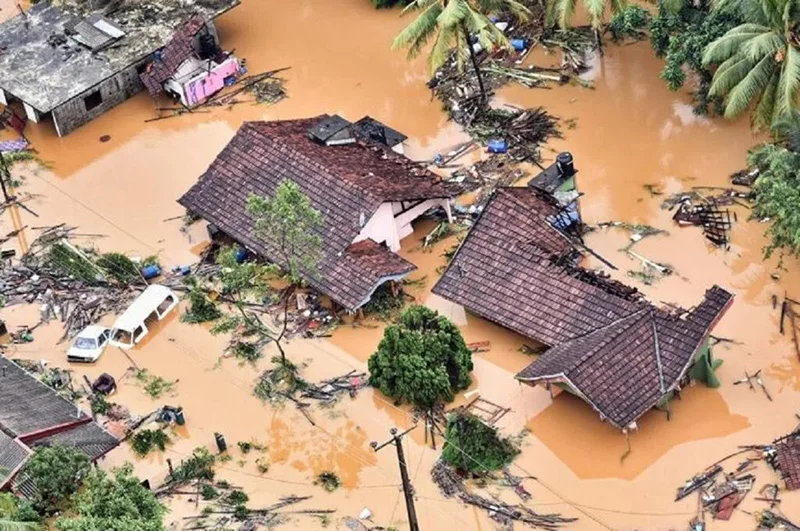
Tropical Cyclone Ditwah, which made landfall in Sri Lanka on 28 November 2025, is considered the country’s worst natural disaster since the deadly 2004 tsunami. It intensified the northeast monsoon, bringing torrential rainfall, massive flooding, and 215 severe landslides across seven districts. The cyclone left a trail of destruction, killing nearly 500 people, displacing over a million, destroying homes, roads, and railway lines, and disabling critical infrastructure including 4,000 transmission towers. Total economic losses are estimated at USD 6–7 billion—exceeding the country’s foreign reserves.
The Sri Lankan Armed Forces have led the relief efforts, aided by international partners including India and Pakistan. A Sri Lanka Air Force helicopter crashed in Wennappuwa, killing the pilot and injuring four others, while five Sri Lanka Navy personnel died in Chundikkulam in the north while widening waterways to mitigate flooding. The bravery and sacrifice of the Sri Lankan Armed Forces during this disaster—as in past disasters—continue to be held in high esteem by grateful Sri Lankans.
The Sri Lankan government, however, is facing intense criticism for its handling of Cyclone Ditwah, including failure to heed early warnings available since November 12, a slow and poorly coordinated response, and inadequate communication with the public. Systemic issues—underinvestment in disaster management, failure to activate protocols, bureaucratic neglect, and a lack of coordination among state institutions—are also blamed for avoidable deaths and destruction.
The causes of climate disasters such as Cyclone Ditwah go far beyond disaster preparedness. Faulty policymaking, mismanagement, and decades of unregulated economic development have eroded the island’s natural defenses. As climate scientist Dr. Thasun Amarasinghe notes:
“Sri Lankan wetlands—the nation’s most effective natural flood-control mechanism—have been bulldosed, filled, encroached upon, and sold. Many of these developments were approved despite warnings from environmental scientists, hydrologists, and even state institutions.”
Sri Lanka’s current vulnerabilities also stem from historical deforestation and plantation agriculture associated with colonial-era export development. Forest cover declined from 82% in 1881 to 70% in 1900, and to 54–50% by 1948, when British rule ended. It fell further to 44% in 1954 and to 16.5% by 2019.
Deforestation contributes an estimated 10–12% of global greenhouse gas emissions. Beyond removing a vital carbon sink, it damages water resources, increases runoff and erosion, and heightens flood and landslide risk. Soil-depleting monocrop agriculture further undermines traditional multi-crop systems that regenerate soil fertility, organic matter, and biodiversity.
In Sri Lanka’s Central Highlands, which were battered by Cyclone Ditwah, deforestation and unregulated construction had destabilised mountain slopes. Although high-risk zones prone to floods and landslides had long been identified, residents were not relocated, and construction and urbanisation continued unchecked.
Sri Lanka was the first country in Asia to adopt neoliberal economic policies. With the “Open Economy” reforms of 1977, a capitalist ideology equating human well-being with quantitative growth and material consumption became widespread. Development efforts were rushed, poorly supervised, and frequently approved without proper environmental assessment.
Privatisation and corporate deregulation weakened state oversight. The recent economic crisis and shrinking budgets further eroded environmental and social protections, including the maintenance of drainage networks, reservoirs, and early-warning systems. These forces have converged to make Sri Lanka a victim of a dual climate threat: gradual environmental collapse and sudden-onset disasters.
Sri Lanka: A Climate Victim
Sri Lanka’s carbon emissions remain relatively small but are rising. The impact of climate change on the island, however, is immense. Annual mean air temperature has increased significantly in recent decades (by 0.016 °C annually between 1961 and 1990). Sea-level rise has caused severe coastal erosion—0.30–0.35 meters per year—affecting nearly 55% of the shoreline. The 2004 tsunami demonstrated the extreme vulnerability of low-lying coastal plains to rising seas.
The Cyclone Ditwah catastrophe was neither wholly new nor surprising. In 2015, the Geneva-based Internal Displacement Monitoring Centre (IDMC) identified Sri Lanka as the South Asian country with the highest relative risk of disaster-related displacement: “For every million inhabitants, 15,000 are at risk of being displaced every year.”
IDMC also noted that in 2017 the country experienced seven disaster events—mainly floods and landslides—resulting in 135,000 new displacements and that Sri Lanka “is also at risk for slow-onset impacts such as soil degradation, saltwater intrusion, water scarcity, and crop failure”.
Sri Lanka ranked sixth among countries most affected by extreme weather events in 2018 (Germanwatch) and second in 2019 (Global Climate Risk Index). Given these warnings, Cyclone Ditwah should not have been a surprise. Scientists have repeatedly cautioned that warmer oceans fuel stronger cyclones and warmer air holds more moisture, leading to extreme rainfall. As the Ceylon Today editorial of December 1, 2025 also observed:
“…our monsoons are no longer predictable. Cyclones form faster, hit harder, and linger longer. Rainfall becomes erratic, intense, and destructive. This is not a coincidence; it is a pattern.”
Without urgent action, even more extreme weather events will threaten Sri Lanka’s habitability and physical survival.
A Global Crisis
Extreme weather events—droughts, wildfires, cyclones, and floods—are becoming the global norm. Up to 1.2 billion people could become “climate refugees” by 2050. Global warming is disrupting weather patterns, destabilising ecosystems, and posing severe risks to life on Earth. Indonesia and Thailand were struck by the rare and devastating Tropical Cyclone Senyar in late November 2025, occurring simultaneously with Cyclone Ditwah’s landfall in Sri Lanka.
More than 75% of global greenhouse gas emissions—and nearly 90% of carbon emissions—come from burning coal, oil, and gas, which supply about 80% of the world’s energy. Countries in the Global South, like Sri Lanka, which contribute least to greenhouse gas emissions, are among the most vulnerable to climate devastation. Yet wealthy nations and multilateral institutions, including the World Bank, continue to subsidise fossil fuel exploration and production. Global climate policymaking—including COP 30 in Belém, Brazil, in 2025—has been criticised as ineffectual and dominated by fossil fuel interests.
If the climate is not stabilised, long-term planetary forces beyond human control may be unleashed. Technology and markets are not inherently the problem; rather, the issue lies in the intentions guiding them. The techno-market worldview, which promotes the belief that well-being increases through limitless growth and consumption, has contributed to severe economic inequality and more frequent extreme weather events. The climate crisis, in turn, reflects a profound mismatch between the exponential expansion of a profit-driven global economy and the far slower evolution of human consciousness needed to uphold morality, compassion, generosity and wisdom.
Sri Lanka’s 2025–26 budget, adopted on November 14, 2025—just as Cyclone Ditwah loomed—promised subsidised land and electricity for companies establishing AI data centers in the country.
President Anura Kumara Dissanayake told Parliament: “Don’t come questioning us on why we are giving land this cheap; we have to make these sacrifices.”
Yet Sri Lanka is a highly water-stressed nation, and a growing body of international research shows that AI data centers consume massive amounts of water and electricity, contributing significantly to greenhouse gas emissions.
The failure of the narrow, competitive techno-market approach underscores the need for an ecological and collective framework capable of addressing the deeper roots of this existential crisis—both for Sri Lanka and the world.
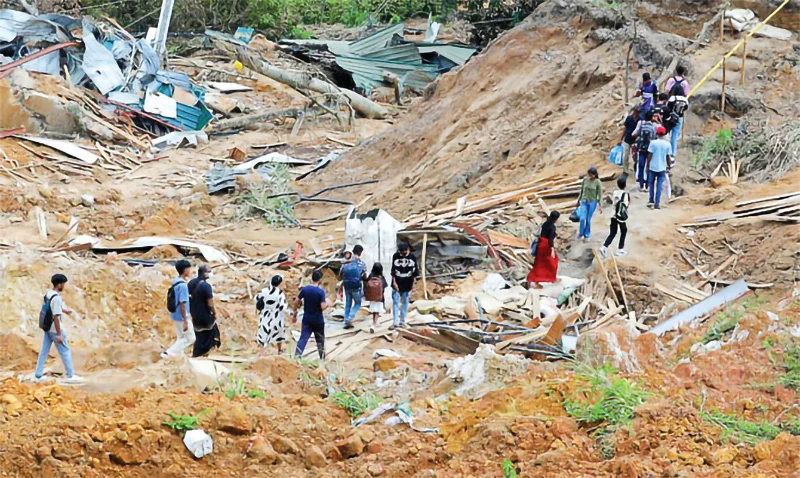
A landslide in Sri Lanka (AFP picture)
Ecological and Human Protection
Ecological consciousness demands
recognition that humanity is part of the Earth, not separate from it. Policies to address climate change must be grounded in this understanding, rather than in worldviews that prize infinite growth and technological dominance. Nature has primacy over human-created systems: the natural world does not depend on humanity, while humanity cannot survive without soil, water, air, sunlight, and the Earth’s essential life-support systems.
Although a climate victim today, Sri Lanka is also home to an ancient ecological civilization dating back to the arrival of the Buddhist monk Mahinda Thera in the 3rd century BCE. Upon meeting King Devanampiyatissa, who was out hunting in Mihintale, Mahinda Thera delivered one of the earliest recorded teachings on ecological interdependence and the duty of rulers to protect nature:
“O great King, the birds of the air and the beasts of the forest have as much right to live and move about in any part of this land as thou. The land belongs to the people and all living beings; thou art only its guardian.”
A stone inscription at Mihintale records that the king forbade the killing of animals and the destruction of trees. The Mihintale Wildlife Sanctuary is believed to be the world’s first.
Sri Lanka’s ancient dry-zone irrigation system—maintained over more than a millennium—stands as a marvel of sustainable development. Its network of interconnected reservoirs, canals, and sluices captured monsoon waters, irrigated fields, controlled floods, and even served as a defensive barrier. Floods occurred, but historical records show no disasters comparable in scale, severity, or frequency to those of today. Ancient rulers, including the legendary reservoir-builder King Parākramabāhu, and generations of rice farmers managed their environment with remarkable discipline and ecological wisdom.
The primacy of nature became especially evident when widespread power outages and the collapse of communication networks during Cyclone Ditwah forced people to rely on one another for survival. The disaster ignited spontaneous acts of compassion and solidarity across all communities—men and women, rich and poor, Buddhists, Christians, Muslims, and Hindus. Local and international efforts mobilized to rescue, shelter, feed, and emotionally support those affected. These actions demonstrated a profound human instinct for care and cooperation, often filling vacuums left by formal emergency systems.
Yet spontaneous solidarity alone is insufficient. Sri Lanka urgently needs policies on sustainable development, environmental protection, and climate resilience. These include strict, science-based regulation of construction; protection of forests and wetlands; proper maintenance of reservoirs; and climate-resilient infrastructure. Schools should teach environmental literacy that builds unity and solidarity, rather than controversial and divisive curriculum changes like the planned removal of history and introduction of contested modules on gender and sexuality.
If the IMF and international creditors—especially BlackRock, Sri Lanka’s largest sovereign bondholder, valued at USD 13 trillion—are genuinely concerned about the country’s suffering, could they not cancel at least some of Sri Lanka’s sovereign debt and support its rebuilding efforts? Addressing the climate emergency and the broader existential crisis facing Sri Lanka and the world ultimately requires an evolution in human consciousness guided by morality, compassion, generosity and wisdom. (Courtesy: IPS NEWS)
Dr Asoka Bandarage is the author of Colonialism in Sri Lanka: The Political Economy of the Kandyan Highlands, 1833-1886 (Mouton) Women, Population and Global Crisis: A Politico-Economic Analysis (Zed Books), The Separatist Conflict in Sri Lanka: Terrorism, Ethnicity, Political Economy, ( Routledge), Sustainability and Well-Being: The Middle Path to Environment, Society and the Economy (Palgrave MacMillan) Crisis in Sri Lanka and the World: Colonial and Neoliberal Origins, Ecological and Collective Alternatives (De Gruyter) and numerous other publications. She serves on the Advisory Boards of the Interfaith Moral Action on Climate and Critical Asian Studies.
Features
Cliff and Hank recreate golden era of ‘The Young Ones’

 Cliff Richard and Hank Marvin’s reunion concert at the Riverside Theatre in Perth, Australia, on 01 November, 2025, was a night to remember.
Cliff Richard and Hank Marvin’s reunion concert at the Riverside Theatre in Perth, Australia, on 01 November, 2025, was a night to remember.
The duo, who first performed together in the 1950s as part of The Shadows, brought the house down with their classic hits and effortless chemistry.
The concert, part of Cliff’s ‘Can’t Stop Me Now’ tour, featured iconic songs like ‘Summer Holiday’, ‘The Young Ones’, ‘Bachelor Boy’, ‘Living Doll’ and a powerful rendition of ‘Mistletoe and Wine.’
Cliff, 85, and Hank, with his signature red Fender Stratocaster, proved that their music and friendship are timeless.
According to reports, the moment the lights dimmed and the first chords of ‘Move It’ rang out, the crowd knew they were in for something extraordinary.
Backed by a full band, and surrounded by dazzling visuals, Cliff strode onto the stage in immaculate form – energetic and confident – and when Hank Marvin joined him mid-set, guitar in hand, the audience erupted in applause that shook the hall.
Together they launched into ‘The Young Ones’, their timeless 1961 hit which brought the crowd to its feet, with many in attendance moved to tears.
The audience was treated to a journey through time, with vintage film clips and state-of-the-art visuals adding to the nostalgic atmosphere.
Highlights of the evening included Cliff’s powerful vocals, Hank’s distinctive guitar riffs, and their playful banter on stage.
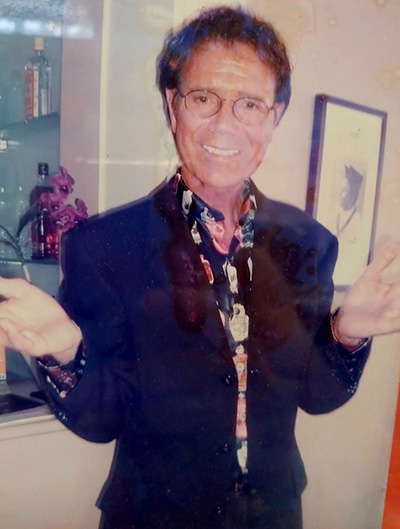
Cliff posing for The Island photographer … February,
2007
Cliff paused between songs to reflect on their shared journey saying:
“It’s been a lifetime of songs, memories, and friendship. Hank and I started this adventure when we were just boys — and look at us now, still up here making noise!”
As the final chords of ‘Congratulations’ filled the theatre, the crowd rose for a thunderous standing ovation that lasted several minutes.
Cliff waved, Hank gave a humble bow, and, together, they left the stage, arm-in-arm, to the refrain of “We’re the young ones — and we always will be.”
Reviews of the show were glowing, with fans and critics alike praising the duo’s energy, camaraderie, and enduring talent.
Overall, the Cliff Richard and Hank Marvin reunion concert was a truly special experience, celebrating the music and friendship that has captivated audiences for decades.
When Cliff Richard visited Sri Lanka, in February, 2007, I was invited to meet him, in his suite, at a hotel, in Colombo, and I presented him with my music page, which carried his story, and he was impressed.
In return, he personally autographed a souvenir for me … that was Cliff Richard, a truly wonderful human being.
-

 News3 days ago
News3 days agoOver 35,000 drug offenders nabbed in 36 days
-

 Business5 days ago
Business5 days agoLOLC Finance Factoring powers business growth
-

 News2 days ago
News2 days agoCyclone Ditwah leaves Sri Lanka’s biodiversity in ruins: Top scientist warns of unseen ecological disaster
-

 News5 days ago
News5 days agoCPC delegation meets JVP for talks on disaster response
-

 Features1 day ago
Features1 day agoFinally, Mahinda Yapa sets the record straight
-

 News5 days ago
News5 days agoA 6th Year Accolade: The Eternal Opulence of My Fair Lady
-

 News3 days ago
News3 days agoRising water level in Malwathu Oya triggers alert in Thanthirimale
-
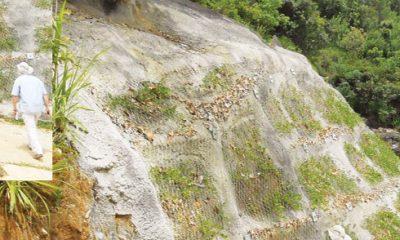
 Features4 days ago
Features4 days agoThe Catastrophic Impact of Tropical Cyclone Ditwah on Sri Lanka:


